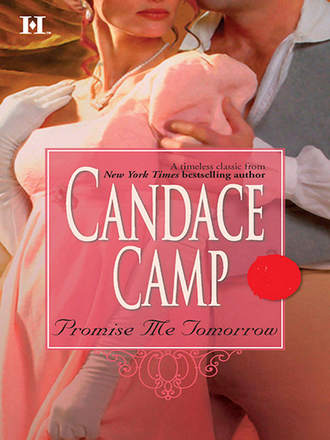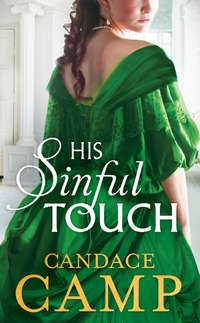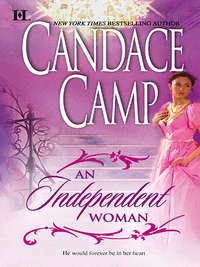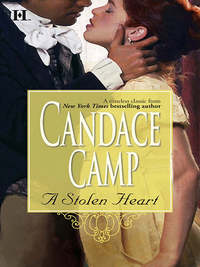
Полная версия
Promise Me Tomorrow

Praise for the novels of
CANDACE CAMP
“Camp has again produced a fast-paced plot brimming with lively conflict among family, lovers and enemies.”
—Publishers Weekly on A Dangerous Man
“Romance, humor, adventure, Incan treasure, dreams, murder, psychics—the latest addition to Camp’s Mad Moreland series has it all.”
—Booklist on An Unexpected Pleasure
“Entertaining, well-written Victorian romantic mystery.”
—The Best Reviews on An Unexpected Pleasure
“A smart, fun-filled romp.”
—Publishers Weekly on Impetuous
“Camp brings the dark Victorian world to life. Her strong characters and perfect pacing keep you turning the pages of this chilling mystery.”
—Romantic Times BOOKreviews on Winterset
“From its delicious beginning to its satisfying ending, [Mesmerized] offers a double helping of romance.”
—Booklist
Promise Me Tomorrow
Candace Camp

CONTENTS
PROLOGUE
CHAPTER ONE
CHAPTER TWO
CHAPTER THREE
CHAPTER FOUR
CHAPTER FIVE
CHAPTER SIX
CHAPTER SEVEN
CHAPTER EIGHT
CHAPTER NINE
CHAPTER TEN
CHAPTER ELEVEN
CHAPTER TWELVE
CHAPTER THIRTEEN
CHAPTER FOURTEEN
CHAPTER FIFTEEN
CHAPTER SIXTEEN
CHAPTER SEVENTEEN
CHAPTER EIGHTEEN
CHAPTER NINETEEN
PROLOGUE
THE CHILD LIFTED HER HEAD SLEEPILY AND looked at the man across from her in the carriage. She blinked, then scowled.
“You’re a bad man.”
The man glanced at her and sighed. “Hush. We’re almost there.”
His face was shadowed in the dim light. He was almost skeletally thin, and he fidgeted constantly. Marie Anne knew that Nurse would have snapped at him to sit still and behave himself.
“I want to go home,” she said plaintively. Everything was so confusing. It had been for weeks. She missed John, and she missed the baby. Most of all, she missed Mama and Papa. She remembered That Night and the way her mother had hustled her out the door and along the dark, scary street. She remembered the familiar scent of Mama’s perfume as she squeezed Marie Anne to her chest, whispering “Take care, ma chérie.” Mama had been crying, and Marie Anne knew that it was the bad people in the streets who made her cry.
“I want to stay with you!” Marie Anne had wailed, clinging tightly to her mother. That had made the baby cry, too, and try to scramble out of Mrs. Ward’s arms and back to their mother. Only John had stood stoically silent and still.
“Oh, chérie! If you only knew—I wish you could, too, but it isn’t safe.” Her mother, more beautiful than any other woman in the world, had wiped the tears from her cheeks and tried to smile. “You must go home to England. To your Mimi and Granpapa. You will like that, won’t you? Mrs. Ward will take you. You know Mrs. Ward. She’s Mama’s ami, and she will take good care of you. She’ll see that you get to Mimi’s house in the City. Papa and I must stay here and get Granmama and Granpere to leave. But as soon as we do, we will join you at Mimi’s house.”
“Promise?”
“I promise, my little love. I promise.”
“Where’s Mama?” Marie Anne asked now, turning to her companion accusingly, “You said we were going to see Mama.” She had cried and kicked when he’d carried her from her bed earlier, until finally he had told her to be still, that he was taking her to her mother.
“We are almost there,” the man repeated glancing out the window.
Marie Anne looked out the window, too, and saw that they were approaching a large building. But it was not their home, nor even Mimi’s large house in the country or the tall white one in the City. It was a huge squat block of gray stone, far too ugly, she knew, to be anyplace where Mama was. Tears filled her eyes.
“That’s not Mimi’s.” For a little while, she and her brother John had been at Mimi’s home in the City. Mrs. Ward, Mama’s friend from Paris, had taken them there, and at first Marie Anne’s sad heart had lifted joyfully, thinking that she was going to get to see her beloved grandmother. But then That Woman had whisked them away, taking them outside and to another house, where the Awful Man was. She had seen him before, but he was not the sort who spoke to children, and she wasn’t sure who he was.
Then That Woman had fed her something and tried to give John something, as well, but he was too sick. She had left them in a room, with John twisting and turning on his bed, sweating and shaking. It had scared Marie Anne to see him like that; it had scared her to be there without any grown-up. But it was even scarier to be away from her big brother, traveling through the dark night with this stranger. Why had Mrs. Ward left them with That Woman? Why had she taken the baby, but not John and Marie Anne? Where was Mimi?
She began to cry, although she did not want to in front of this odd, jittery man whom she did not know at all. “I want Mimi,” she said, her voice trembling. “I want Nurse. I want Mama!”
“Later, later.” His voice was impatient, and he barely waited for the carriage to stop before he unlatched the door and jumped down. He reached for her, but Marie Anne backed away, her heart thumping. The ugly building loomed outside, and she was certain she did not want to go there.
“No. No!” The word ended in a shriek as he wrapped one arm around her and dragged her out.
She screamed and began to struggle. “Mama! Papa!”
He carried her inexorably up the front stairs to the door and banged the heavy knocker. It was some minutes before the door was opened by a scowling servant, and some time more before a large, stern-looking woman swept into the entryway, a dressing gown wrapped around her and a nightcap on her head.
The sight of her was enough to freeze Marie Anne’s sobs in her throat. She stared at the woman, ice forming in the pit of her stomach. The woman was tall and heavyset, with none of the beauty and warmth that lived in Marie Anne’s mother and grandmothers. This woman’s eyes were pale and cold as metal, and her face was grim, dominated by a predatory beak of a nose. She looked at Marie Anne as though she knew every naughty thing the girl had ever done.
“I found her,” the jittery man was saying. “She was on the side of the road, obviously abandoned. I didn’t know where else to take her.”
His words were enough to jolt Marie Anne out of her fear, and she cried out indignantly, “That’s a lie! I wasn’t on the side of the road!”
The woman clapped her hands together so loudly that both Marie Anne and the man jumped. “Enough!” Her voice cracked like a whip. “Don’t presume to correct your betters, child. You will soon learn that here you speak only when spoken to, and you do not contradict an adult.”
Her tone made Marie Anne’s heart thump inside her chest, but she squared her shoulders and thrust out her chin. She was not the sort to knuckle under without a fight. She thought of the way her father would ruffle her hair and chuckle, calling her his tiger.
“But I wasn’t by the side of the road,” she insisted.
The woman’s eyes narrowed. “I can see that you are going to be stiff-necked. Redheads are always trouble.”
“I am sure she will settle down,” the man said quickly, panic tinging his voice. “Once she has been here awhile, she will be all right.”
“Don’t worry, sir,” the woman replied with a faintly sardonic smile. She looked at him as if she, too, knew what he was thinking, Marie Anne noticed. “We shall take her. I am not one to turn away a soul just because she is obviously in need of improvement. We shall straighten her out soon enough.” The woman’s eyes sparkled with anticipation.
The man let out a sigh of relief and set Marie Anne down. “Thank you.”
He turned and hurried toward the door. Little as the girl had liked him, it frightened her to see him leave. Even he was better than this hard-faced woman.
“No! Wait!” Marie Anne shrieked, turning to run after him, but the woman hooked a hand in her sash and jerked her back.
“Stop it! Stop that behavior this instant!” The woman accompanied her words with a stinging slap to the back of the girl’s legs, bare below her skirts.
Marie Anne, who had never been struck in her life, whirled and gaped at the woman. The man hurried out the door, closing it after him.
“That’s better.” The woman nodded approvingly. “The children of St. Anselm’s do not act that way, as you will soon find out. The children of St. Anselm’s are quiet and obedient. Now…” Satisfied that she had set this unseemly child on the proper path, the woman looked her over. “How old are you?”
“Five,” the girl responded promptly, rather proud of her age.
“And what is your name?”
“Marie Anne.”
“That is scarcely a proper name for a child of your sort. No doubt you are that gentleman’s by-blow. Just plain Mary will do fine for you. Do you have a last name?”
Marie Anne stared at her. “I—I’m not sure. I am just Marie Anne.”
“Do you have a father?”
“Of course I do!” Marie Anne responded indignantly. “And he will come here and get me! And he will make you sorry!”
“No doubt,” the matron said dryly. “There are many children waiting for their fathers to come. In the meantime, we shall have to give you a name. Now, what do people call your father?”
“Chilton,” she answered.
“All right. Mary Chilton. That is your name. I am called Mrs. Brown. I am the matron of St. Anselm’s.”
“But that’s not my name,” Marie Anne protested indignantly.
“It is now. Do not contradict me. I told you before that that is not acceptable behavior.”
“But you’re wrong!”
Mrs. Brown’s hand lashed out and slapped Marie Anne sharply across her ear. “You will not speak to me that way. Do you understand?”
Stunned, Marie Anne nodded, her hand going up to her cheek. Never in her life had she been treated in such a manner. Even during the past few harrowing weeks, rocking about the countryside with Mrs. Ward and John and the baby, running from those bad people and having to pretend that they were Mrs. Ward’s children—even during all that, no one had ever raised a hand to her or talked to her in this way. Tears pooled in her eyes, and for a moment she wavered on the edge of bursting into tears. But years of aristocratic breeding came to her rescue, and she stiffened her back, gazing up at the woman coolly. Mama would say that this woman was déclassée, she decided. Papa, on the other hand, would say that what she had done was “bad form.” She clung to the words, hearing her parents in her head.
“Answer me when I speak to you,” Mrs. Brown snapped.
“Yes, Mrs. Brown,” Marie Anne responded dutifully, but her voice was chilly and carried all the humility of a duchess.
The older woman looked at her sharply but could not quite put her finger on what it was in the girl’s tone that raised her hackles. Finally she turned away, saying crisply, “Follow me.”
She led her up the stairs and down a hallway barely lit by a few sconces on the wall. The candlelight flickered and flared, casting strange shadows. Marie Anne felt fear rising up in her throat, but she pushed it back down. She could hear her Mimi’s voice the time she had gone running to her in tears when John and the boys were teasing her with scary stories: “Head up, my girl. Never let them know you’re afraid. It would give them far too much pleasure.”
Mrs. Brown stopped at a cupboard and opened it, pulling out a thin blanket and a folded brown dress. To the top of the pile she added a white petticoat, faded through many washings, a pair of rough lisle stockings, darned in several places, and an overly large nightgown. She handed the stack to Marie Anne.
“Here are your clothes and a blanket for your bed.”
Marie Anne looked doubtfully at the ugly brown dress. “But I have clothes. I like my dress better.”
The older woman cast a scornful glance at Marie Anne’s attire. “Your clothes are completely inappropriate. Far above your station. You are at St. Anselm’s now, and you will wear the dress I gave you.”
Remembering the stinging slap, Marie Anne decided not to argue. She merely hugged the stack of her new possessions tightly to her chest and followed Mrs. Brown into the room beyond the cupboard.
It was a long room, lined with narrow beds along either side. Beside each bed was a small chest with three drawers. In each bed lay a girl. Marie Anne had never seen so many people sleeping in one room before. Was she expected to sleep here, among so many other children? Where was her room? She thought with longing of the nursery at home, with her own snug little room, and John and Nurse and the baby all in their little rooms across the schoolroom from her.
Some of the children slept, but most of them awoke at Mrs. Brown’s entrance. In the glow of the woman’s candle, Marie Anne could see wide-open eyes peeking out from beneath their blankets. Mrs. Brown turned to Marie Anne.
“Now, I want you to undress and get into bed. Tomorrow you will be introduced to the other children and assigned your duties.”
“Duties?”
“Of course. Everyone earns their keep around here.” The woman turned and started away.
“But—what about the light?” Marie Anne asked, unable to completely hide the tremor in her voice at the thought of being left here in the dark. “How can I see to undress?”
“There is plenty of light from the windows,” the matron answered, indicating the tall, curtainless windows that lined either side of the room. “I don’t allow children to waste candles.”
With those words, the woman strode out of the room. Marie Anne watched the flickering light of her candle recede. Tears welled in her eyes, and her chin began to wobble, no matter how hard she struggled to keep it still. She had never felt so alone in all her life, even the night her mother had handed them over to Mrs. Ward, then hurried out the door, sobbing. At least then she had had John and Alexandra, and she had known Mrs. Ward, who was a kind, soft-spoken woman. But now—now she was utterly alone and abandoned.
A small hand slipped into hers, and a soft voice whispered, “’Ere now, don’t cry. It’ll be better tomorrow, you’ll see.”
Marie Anne turned to see a girl about her size, but with a face much older than hers. She looked at the girl curiously, her tears slowly subsiding. She wiped them away with her hand and said, “Hullo. Who are you?”
“I’m Winny,” the girl responded with a shy smile. “I’m eight. Wot’s your name?”
“Marie Anne. But that woman said now I must be Mary.”
The little girl nodded. “She likes plain names. ‘Ow old are you? Would you like to be my friend?”
“Aw, don’t be daft, Winny.” A rough voice spoke from the bed on the other side of them, and an older girl swung around to sit on the side of the bed, facing them. She had curly dark hair poorly suppressed into braids, and a round, pugnacious face liberally sprinkled with freckles. “’Oo’d want to be friends with the likes o’ you?”
“I would,” Marie Anne told the other girl stoutly. “Winny seems very nice.”
“’Winny seems very nice,’” the other girl mimicked in a high voice, striving to imitate Marie Anne’s precise diction. “’Oo’re you, a bleedin’ princess?”
Marie Anne lifted her chin. “No, but I shall be a duchess one day, if I want. Mimi said so.”
“A duchess!” This statement afforded the other girl much amusement, for she slapped her thigh and rocked with laughter. “Lookee ‘ere, everybody, we got a bleedin’ duchess among us.”
Marie Anne frowned at her. “You shouldn’t use such words. Nurse says it’s wicked and—and low class. Beside, I’m not a duchess now. But I will be, if I want to. Mimi said I could—and she’s a countess!”
“The Duchess of St. Anselm’s,” the other girl pronounced, still chuckling.
“Never mind her,” Winny whispered. “Betty don’t like anyone. I think you look like a duchess.” She touched the sleeve of Marie Anne’s dress admiringly. “But you’d best get into your nightgown now. Miss Patman will be coming through shortly. She comes every hour to check on us, and she’ll punish you if you’re out o’ bed.”
Marie Anne sighed. She didn’t want to take off her clothes and put on the rough nightgown, but she was dreadfully tired. And perhaps if she went to sleep, she would wake up the next morning and find herself back in the nursery with John and the baby, and Nurse waking them up with a cheerful hello and a cup of hot chocolate.
She unbuttoned her dress with Winny’s help, pulled it off and reached for the nightdress to put it on.
“’Ere! Wot’s that?” Betty, still watching her, leaned forward now and reached for the locket around Marie Anne’s neck.
Marie Anne stepped back quickly, her hand closing around the precious locket. Mimi had given it to her last Boxing Day. It was gold and opened to show a cunning little portrait of her mother on one side and of her father on the other. The front was inscribed with an ornate, looping M for Marie. Mimi had given one just like it to the baby, with an A on the front for Alexandra. Of course, the baby was too young to wear it, only two, but Marie Anne had put hers on and never took it off.
“Give it to me,” Betty demanded, getting up and coming around the bed toward her.
“No! It’s mine! Mimi gave it to me.”
Betty’s face lit with a wicked glee. “It’s mine now.”
Her hand lashed out and grabbed Marie Anne’s smaller fist. She jerked it toward her, and the chain of the locket bit painfully into Marie Anne’s neck. All the anger and fear of the past few weeks exploded now in Marie Anne, and she let out a feral shriek and sank her teeth into the other girl’s hand.
Betty jerked back her hand, letting out a yowl. She drew back her other fist to hit the smaller girl, but Marie Anne was on her like a wild thing, hitting and kicking and biting. Finally, laughing, the oldest girl in the room came over and hauled Marie Anne off the bully and set her on her feet. Betty sat up, hunched over, trying to nurse both her injured hand and her bleeding nose, and gasping for air from a blow that had landed square in her stomach.
“I think you met your match, Bet,” the fourteen-year-old said in an amused voice. She made a mocking bow toward the little girl standing beside her, still rigid with fury. “Pleased to make your acquaintance, Duchess. I’m Sally Gravers.”
“Thank you. I’m pleased to meet you, too,” Marie told her, giving a little curtsy, just as Nurse had taught her to do when she met important adults. Sally Gravers wasn’t an adult, but she looked the most important person in this group, so the gesture seemed appropriate.
The older girl grinned, further amused. “You’re all right.” She turned toward Betty and scowled. “You leave ‘er alone now. You ‘ear me? That trinket’s ‘ers.”
“All right, Sally,” the bully replied in a surly voice, shooting Marie Anne a venomous look.
“Right now. Let’s get some sleep,” Sally went on. “I, for one, ain’t lookin’ forward to getting up at five and scrubbin’ floors on no sleep.”
Marie Anne gaped at the older girl, scarcely able to believe her ears. Had she somehow become a maidservant? But, given the topsy-turvy events of the last few weeks, she knew that anything was possible. She scrambled into her nightgown, tucking the locket protectively beneath it.
Winny, still beside her, whispered, “She won’t steal it now—she’s too afraid of Sally. But the matron will take it if she sees it. She’ll say it’s above you. I’ve got a ‘idin’ place. No one’s ever found it. I’ll show it to you, and you can ‘ide it there.”
Marie Anne nodded gratefully as she and Winny spread the blanket over the narrow mattress. Then she crawled into bed, remembering with a sigh the deep feather mattress of her bed at home and the layers of thick, warm blankets that Nurse would tuck around her at night. The thought led her to memories of her mother coming in to kiss her good-night. Sometimes she would be already dressed to go out, her elegant brocade dress spreading out wide beneath her narrow waist, her hair powdered and towering in a confection of curls, decorated with jewels or feathers. Other times, she would still be in a dressing gown, and her thick black hair would be tumbling down around her shoulders in a curling cloud. She would bend over Marie Anne and whisper that she loved her. Marie Anne could smell again the orris root of her powder mingling with the scent of her perfume.
Tears seeped out of her eyes, and she lifted the locket out from beneath her nightgown, her fist closing around it. Why hadn’t Mama come for them? She had told them that she and Papa would join them as soon as they could. A horrible lonely feeling welled inside Marie Anne as a wicked voice whispered that Mama and Papa no longer wanted her.
But that wasn’t true! Marie struggled against the engulfing horror. She knew her mother and father loved her. They would come and get her, and they would find the baby, too, and John—and he wouldn’t be sick anymore. She just had to hold on, she told herself, and someday they would come for her. Someday her family would find her, and she would be happy again….
CHAPTER ONE
MARIANNE DREW A DEEP BREATH AS SHE surveyed the glittering crowd. She had never been to a party this large, nor one filled with so many titled people. She wondered what they would think if they knew she was plain Mary Chilton from St. Anselm’s Orphanage, not the genteel widow Mrs. Marianne Cotterwood.
She smiled to herself. The thing she enjoyed the most about her pretense was the idea of pulling the wool over the eyes of the aristocracy, of conversing with some blue-blooded member of the ton—who would have been horrified if he had known that he was speaking to a former chambermaid as if to an equal.
The thought settled her nerves somewhat. This might be a larger and more cosmopolitan set of people than she had deceived in the resorts of Bath and Brighton, but essentially they were the same. If one spoke as if one were genteel, and walked and sat and ate as if one had been trained to do so from birth, people assumed that one belonged. As long as she kept her lies small and plausible and was careful never to pretend to be someone more than the minor gentry, it was doubtful that anyone would sniff out her deceit. After all, most of the people here were too self-absorbed to spare much thought for anyone else, for good or ill. That was one of the traits which made it so easy to prey upon them.
Marianne regarded all members of the ruling class as her natural enemies. She could still remember the days at the orphanage, when the grand ladies would come on their “missions of mercy.” Well-fed and warm, they would stand in their elegant dresses that cost more than would be spent on any of the orphans in a year and look at them with pitying contempt. Then they would go away, feeling vastly superior and quite holy for their charity. Marianne had stared at them with anger burning in her heart. Nothing that happened to her after the orphanage had lessened her contempt for them. She had been sent into service at Lady Quartermaine’s house when she was fourteen, and there she had worked as a housemaid, emptying ashes from the fireplace, hauling water for baths, and cleaning, all for less than a shilling a day, with only Sunday afternoons off—and woe to her if anything was deemed ill-done or amiss. Of course, even that did not compare to what else had happened to her at Quartermaine Hall….
“It’s a lovely party,” Marianne’s companion said, and Marianne turned to her, firmly shoving aside her thoughts.








